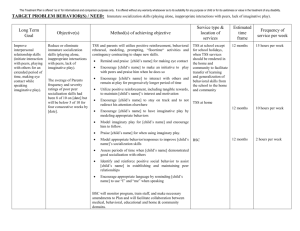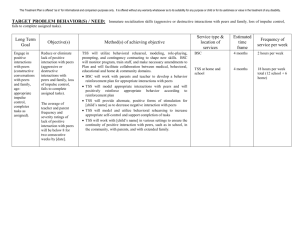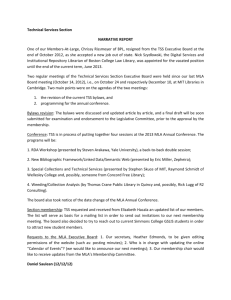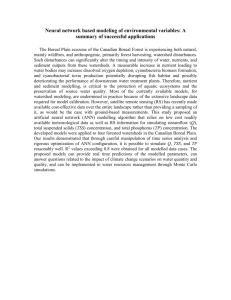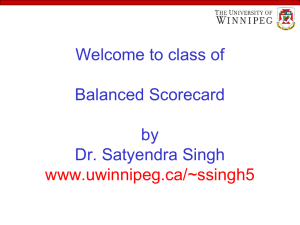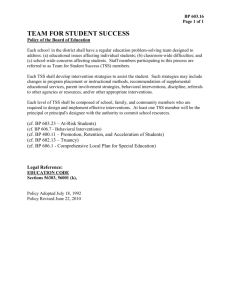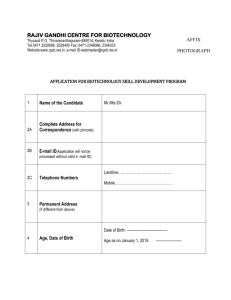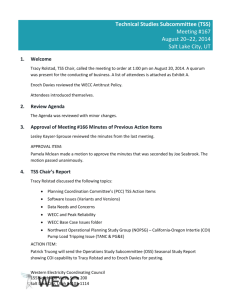*LN* (Last name) - The Institute for Behavior Change
advertisement
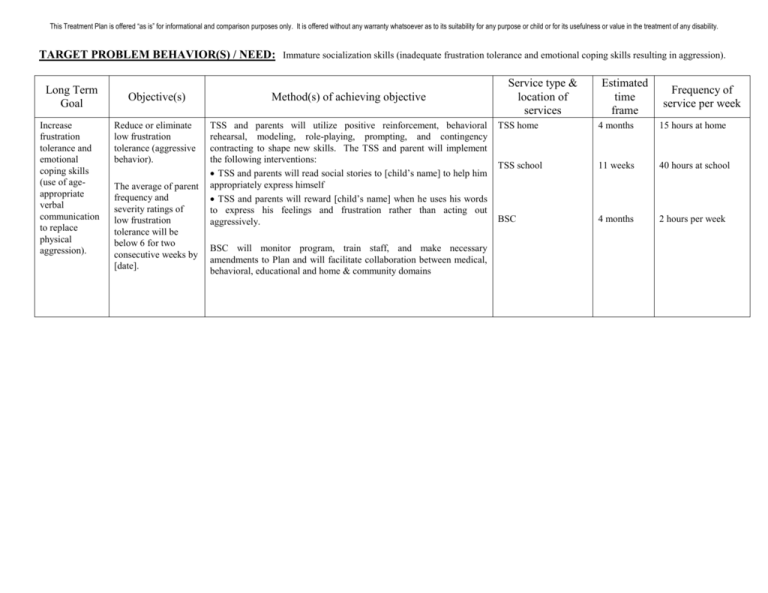
This Treatment Plan is offered “as is” for informational and comparison purposes only. It is offered without any warranty whatsoever as to its suitability for any purpose or child or for its usefulness or value in the treatment of any disability. TARGET PROBLEM BEHAVIOR(S) / NEED: Immature socialization skills (inadequate frustration tolerance and emotional coping skills resulting in aggression). Long Term Goal Increase frustration tolerance and emotional coping skills (use of ageappropriate verbal communication to replace physical aggression). Objective(s) Method(s) of achieving objective Reduce or eliminate low frustration tolerance (aggressive behavior). TSS and parents will utilize positive reinforcement, behavioral rehearsal, modeling, role-playing, prompting, and contingency contracting to shape new skills. The TSS and parent will implement the following interventions: TSS and parents will read social stories to [child’s name] to help him appropriately express himself TSS and parents will reward [child’s name] when he uses his words to express his feelings and frustration rather than acting out aggressively. The average of parent frequency and severity ratings of low frustration tolerance will be below 6 for two consecutive weeks by [date]. BSC will monitor program, train staff, and make necessary amendments to Plan and will facilitate collaboration between medical, behavioral, educational and home & community domains Service type & location of services Estimated time frame Frequency of service per week TSS home 4 months 15 hours at home TSS school 11 weeks 40 hours at school BSC 4 months 2 hours per week Outcome Data (collected weekly) Each week, the parent is asked to rate the child’s frequency and severity of involvement in Target Behavior on a scale from 1 (minimal) to 10 (extreme). The average of these frequency and severity ratings is calculated each week, as shown below. Cells with an x character indicate a week in which no data was collected. A positive value in the Change column indicates behavioral improvement. Start 6 8 5 6 5 4 2 3 5 5 2 3 End Change 4 1.54 Staffing for EPSDT services (Behavioral Health Rehabilitation (BHR) Services) in Pennsylvania Parent / Teacher / Caretaker collaboration: It is always presumed (and explicitly stated in many Treatment Plans) that the parent is always actively involved in the development of any Treatment Plan, and that the parent (and the teacher or classroom aide, if services are rendered in a school), is always actively involved in the development of any Treatment Plan that is implemented in the school setting. Treatment services are always “icing on someone else’s cake” but the parent need not be present in the same room at all times when the Treatment Plan is being implemented. The parent or another responsible adult caretaker can never be absent from the home or the classroom while a treatment provider is present. The role and responsibility of the parent, teacher or classroom aide (delivering medical treatment, chaperoning the child to the bathroom, providing academic tutoring that is unrelated to behavioral intervention, etc.), cannot be taken-over by the treatment provider in any setting. TSS: Therapeutic Staff Support provider. A TSS provider is usually a person with a Bachelors degree and experience as a provider of direct-care service to children. The TSS provider works under the supervision of a Masters-level mental health professional. BSC: Behavior Specialist Consultant. A BSC is a person with a Masters or Doctoral degree in psychology who may supervise the TSS provider and who receives supervision themselves from a licensed professional psychologist (at least one hour weekly). The Licensed Psychologist assumes full and complete responsibility for the delivery of MT services by all supervisees (psychologists can supervise up to three full-time equivalents of BSC or MT service providers in a given week). Most BSC providers also deliver MT services, but not to the same clients. MT: Mobile Therapist. A MT is a person with a Masters or Doctoral degree in psychology who has training and experience in providing psychological counseling or therapy. They can supervise TSS providers and receive supervision themselves from a licensed professional psychologist (as often as necessary for the efficient and effective delivery of psychological counseling and therapy). The Licensed Psychologist assumes full and complete responsibility for the delivery of MT services by all supervisees (psychologists can supervise up to three full-time equivalents of MT or BSC service providers in a given week). Most MT providers also deliver BSC services, but not to the same clients. See www.ibc-pa.org/job_descriptions.htm for the credentials and complete job descriptions for TSS, BSC, MT and other BHR Service providers. For more Information about EPSDT service delivery in Pennsylvania, visit www.ibc-pa.org
